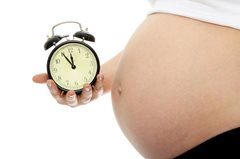 Women in their 40s expect fertility treatment to rewind their ‘biological clock’, and are upset when they find out they can’t have babies, warns a top fertility specialist.
Women in their 40s expect fertility treatment to rewind their ‘biological clock’, and are upset when they find out they can’t have babies, warns a top fertility specialist.
Demand for IVF from older women is rising dramatically, but they don’t realise the chances of success are limited, said Pasquale Patrizio, of the Yale Fertility Center in the U.S. He said the latest research showed success rates for women aged 42 and over had stayed static at less than 10 per cent.
Even if a woman conceives, being older makes it less likely a live baby will be born and pushes up the risk of abnormalities. Professor Patrizio said: ‘There is an alarming misconception about fertility among women. As clinicians, we should begin educating women more aggressively.’
He and his colleagues have noticed more women coming to their fertility clinic at age 43 or older, expecting that pregnancy can be instantly achieved. He added: ‘We are really seeing more and more patients upset after failing in having their own biological child after age 43 so we had to report on this.
‘Their typical reaction is, “what do you mean you cannot help me? I am healthy, I exercise, and I cannot have my own baby?’’’ The latest report comes as UK figures show 40-somethings are becoming pregnant at more than double the rate of two decades ago.
But there is growing concern among British doctors over the ‘epidemic of pregnancy’ in women in middle age. Some of the country’s leading fertility specialists have warned that women who put off having children are ‘defying nature’ and risk never becoming mothers.
The Yale researchers said women who delayed pregnancies in their most fertile years were ‘vaguely aware’ that fertility decreased with age, but only when they experienced age-related infertility first-hand did they begin to understand the reality of their situation.
Britain's oldest first time mum: Sue Tollefsen says she made a mistake in waiting until she was 57 to give birth to daughter Freya. The growing popularity of assisted reproductive technologies (ART) has given women the impression that female fertility may be manipulated at any stage in life, and the problem is made worse by images of celebrities who seem to effortlessly give birth at advanced ages, said Professor Patrizio. U.S. figures show the number of IVF cycles performed between 2003 and 2009 for women aged over 40 increased by 41 per cent – four times as fast as for women aged under 35.
Professor Patrizio said: ‘Even though the number of women turning to ART has increased, the number of IVF cycles resulting in pregnancy in women above age 42 has mostly remained static at 9 per cent.
‘If pregnancy is achieved at an older age, women then face higher risk of pregnancy loss, birth defects, and other complications. ‘Women should be given the appropriate information about postponing fertility, obstetric risks, and the limited success of ART in advanced age to allow them to make informed decisions about when, if at all, they hope to become pregnant.’ Professor Patrizio said women should take advantage of egg-freezing if they wanted to postpone motherhood.
Alternative options such as egg donation, which leads to the highest pregnancy rates reported for any type of fertility treatment, are also available. He added: ‘There is an urgent need to educate women that reproductive ageing is irreversible and, more importantly that there are options to safeguard against the risk of future infertility.’
Last month, Britain’s oldest first-time mother, Sue Tollefsen, admitted she had made a mistake in waiting until she was 57. She regretted not having a baby earlier because she might not be around to see her daughter grow up.
Article: 6th April 2012 www.dailymail.co.uk
Are you over 40 and trying to get pregnant? maximise your chances of conceiving naturally.